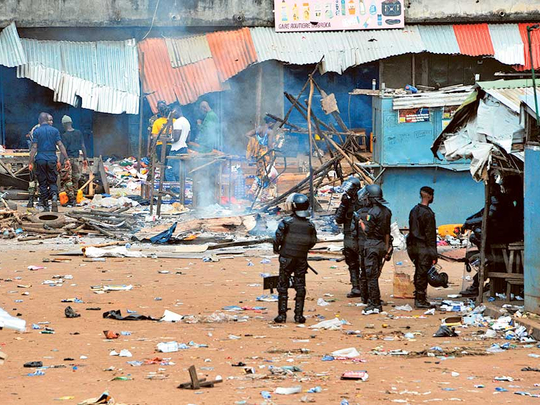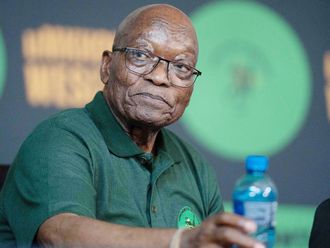
CONAKRY: Guinea was on a knife-edge Saturday, on the eve of a presidential election, after clashes between supporters of incumbent leader Alpha Conde and his main rival left seven people dead, according to security sources and local authorities.
“We have seen since yesterday a deterioration in the security situation,” UN special representative for West Africa Mohammad Ibn Chambas told a press conference Friday, issuing a call for calm a day after deadly clashes in the capital Conakry and in the east.
In Conakry, two people were killed in confrontations between Condo supporters and backers of opposition leader Cellou Dalein Diallo after Conde rejected opposition calls for Sunday’s vote — the second since Guinea’s first democratic election in 2010 — to be delayed over alleged irregularities in the voter registration process.
A further five people were killed Thursday evening in the southeastern Banankoro district after their house was torched and dozens of people were injured by gunshots, Banankoro’s mayor told AFP.
After a largely peaceful campaign, tensions rose sharply this week after Diallo called for the poll to be delayed on the grounds that the electoral roll has been stacked in favour of Conde, who is favoured to win a second term.
“We won’t take part in an electoral sham,” Diallo said at his last campaign rally.
“Otherwise we shan’t accept the results and I shall mobilise the population with all the other [opposition] candidates to reject them,” he warned, accusing the Independent National Electoral Commission (CENI) of being “incompetent and biased”.
Six of Conde’s seven opponents — who include three former prime ministers — have called for the vote to be postponed, citing the unreliability of the electoral lists and problems with distributing electoral cards.
But Conde told journalists the commission was “perfectly entitled to organise the election on October 11.”
In Conakry on Friday, traffic was disrupted on the motorway leading to the airport as Conde supporters stopped cars and pedestrians suspected of backing the opposition.
Conde on Friday visited the city’s sprawling Madina market, where traders from his Malinke people had their wares torched Thursday by supporters of Diallo’s Fulani-dominated UFDG party.
“I call on my supporters not to attack anybody, irrespective of their political and ethnic affiliation,” Diallo told the private Espace FM radio station, while adding they should “defend themselves if attacked”.
Some 19,000 police and security personnel have been deployed to keep the peace.
Nevertheless, at one stage the motorcade of Prime Minister Mohammad Saeed Fofana was forced to make a detour to avoid a shower of rocks being hurled by rival groups, a police source said.
“I’ve visited several districts since this morning and I can say that what I have seen is very serious,” Human Rights Minister Kalifa Gassama Diaby told AFP Friday, adding that he would be calling for police reinforcements.
A 72-member European Union observer mission is in Guinea to monitor the ballot.
“We’re ready for an election that should take place on Sunday,” mission chief Frank Engel said, before visiting the southeastern town of N’Zerekore, where one person died and dozens were injured last week in clashes between supporters of Conde and Diallo.
Diallo accuses the electoral commission of including minors on the electoral roll to boost Conde’s chances of re-election.
Conde insists that the panel is independent.
CENI spokesman Amadou Salifou Kebe said the election could go ahead Sunday as planned but acknowledged problems in the distribution of voting cards.
Conde, whose election in 2010 marked an end to two years of bloody military rule, aims to be returned to office in the first round of the poll.
His election in 2010 was the first free vote in the West African country of 12 million people, with a reputation for trouble at election time.
He points out that during his five years at the helm, the army and judiciary have been reformed, a hydroelectric dam has been completed and mining contracts have been made more transparent, while a severe outbreak of Ebola was also brought under control.
“Ask the people of Guinea if what we have done in five years, the others did in 50. Ask that on the streets,” he said in an interview.
Guineans in neighbouring Sierra Leone who have not received voters’ cards ransacked their embassy in protests this week, ambassador Fode Camara said Thursday.
Sierra Leonean police said they had arrested 29 Guineans.
— AFP












